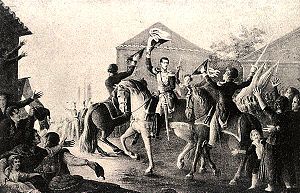
April Revolt
Encyclopedia

The April Revolt, or Abrilada, in the history of Portugal
History of Portugal
The history of Portugal, a European and an Atlantic nation, dates back to the Early Middle Ages. In the 15th and 16th centuries, it ascended to the status of a world power during Europe's "Age of Discovery" as it built up a vast empire including possessions in South America, Africa, Asia and...
, was a political revolt of absoluteness
Absolutism (European history)
Absolutism or The Age of Absolutism is a historiographical term used to describe a form of monarchical power that is unrestrained by all other institutions, such as churches, legislatures, or social elites...
which took place in April 1824. Succeeded Vilafrancada (1823) and foreshadowed the Portuguese Civil War (1828–1834).
History
On April 30, 1824, Prince MiguelMiguel of Portugal
Dom Miguel I, sometimes Michael , was the King of Portugal between 1828 and 1834, the seventh child and second son of King John VI and his queen, Charlotte of Spain....
, who was appointed generalissimo of the Portuguese Army
Portuguese Army
The Portuguese Army is the ground branch of the Portuguese Armed Forces which, in co-operation with other branches of the Portuguese military, is charged with the defence of Portugal...
, in the dungeons of the Castle of São Jorge and the Tower of Belém, held top civilian and military people of the country. Among them stood out the figures of the Quartermaster-General of Police, Baron Rendufe, the Duke of Palmela
Duke of Palmela
The Duke of Palmela is a Portuguese title granted by royal decree of Queen Maria II of Portugal, dated from October 18, 1850, to Dom Pedro de Sousa Holstein , a Portuguese politician during the first half of the 19th Century...
(then in government in coalition with the Earl of Subserra) and the Vicomte de Santa Marta. D. Miguel, who had the support of his mother Carlota Joaquina, considering them guilty of being supporters of liberalism
Liberalism
Liberalism is the belief in the importance of liberty and equal rights. Liberals espouse a wide array of views depending on their understanding of these principles, but generally, liberals support ideas such as constitutionalism, liberal democracy, free and fair elections, human rights,...
and his father, D. John VI
John VI of Portugal
John VI John VI John VI (full name: João Maria José Francisco Xavier de Paula Luís António Domingos Rafael; (13 May 1767 – 10 March 1826) was King of the United Kingdom of Portugal, Brazil and the Algarves (later changed to just King of Portugal and the Algarves, after Brazil was recognized...
, with its stated intention to end what he called "pestilential bevy of free-masons", a reference to Freemasonry
Freemasonry
Freemasonry is a fraternal organisation that arose from obscure origins in the late 16th to early 17th century. Freemasonry now exists in various forms all over the world, with a membership estimated at around six million, including approximately 150,000 under the jurisdictions of the Grand Lodge...
liberal and constitutional.

Rossio
The Rossio is the popular name of the Pedro IV Square in the city of Lisbon, in Portugal. It is located in the Pombaline Downtown of Lisbon and has been one of its main squares since the Middle Ages...
, Lisbon
Lisbon
Lisbon is the capital city and largest city of Portugal with a population of 545,245 within its administrative limits on a land area of . The urban area of Lisbon extends beyond the administrative city limits with a population of 3 million on an area of , making it the 9th most populous urban...
, then installing its headquarters. Still gave orders to impose siege to the Palace of Bemposta
Bemposta Palace
The Bemposta Palace , also known as the Paço da Rainha , is a neoclassical palace originally ordered built by the Dowager-Queen Catherine of Braganza after returning to Lisbon, in the area of Bemposta, now the civil parish of Pena...
, where the knig was, accompanied by his English adviser, General William Carr Beresford.
To solve this conflict was decisive support of the diplomatic corps in Portugal, namely the action of the French ambassador Hyde de Neuville. In an attempt at appeasement, one diplomat managed to enter the palace and convince the king to call his son. Was achieved, thereby, an agreement which brought back the troops to barracks, but that the detainees had been closed, with the exception of Palmela, who took refuge in a British ship, continuing the political instability and military.
In May, diplomats helped D. John VI to take refuge in the British ship , where he took a series of measures: resigned D. Miguel from his office in the Army, ordered the release of political prisoners and the capture of the supporters of his son, who was summoned to come aboard. Once retained, D. Miguel was forced to embark for France in the frigate Pearl, putting an end to the uprising of miguelistas. The infant was deported from there to Vienna
Vienna
Vienna is the capital and largest city of the Republic of Austria and one of the nine states of Austria. Vienna is Austria's primary city, with a population of about 1.723 million , and is by far the largest city in Austria, as well as its cultural, economic, and political centre...
, and Dona Carlota Joaquina, was hospitalized in the Palace of Queluz.

